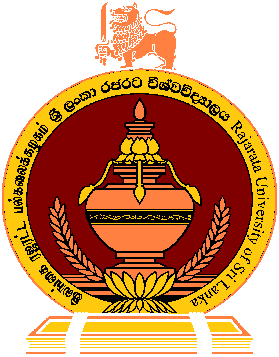The Graduate Profile of Bachelor of Science in Applied Sciences
The B.Sc. in Applied Sciences (General) Degree Program fulfills the requirements of the Level 5 of Sri Lanka Qualification Framework (SLQF – 2015) with 90 credits of teaching and learning workload. The figure below summarizes the degree program.
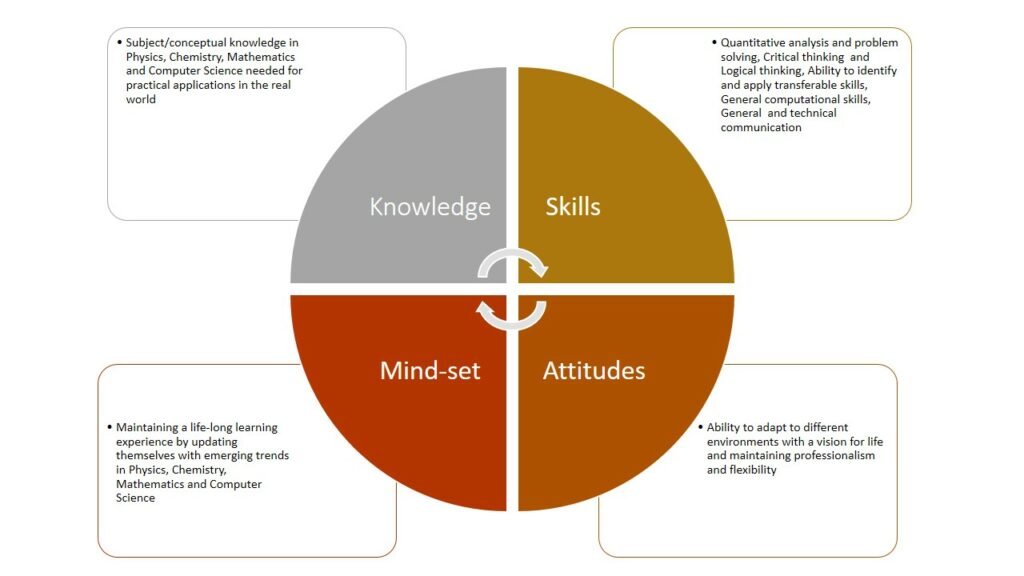
Program Intended Learning Outcomes
In order to create a graduate with adequate knowledge, skills, attitudes and mind-set in the fields of Physics, Chemistry, Mathematics and Computer Science, the program is designed to achieve 12 specific Program Intended Learning Outcomes (PILO). Thus, at the successful completion of the B.Sc. in Applied Sciences (General) degree program, a student should be able to:
- Express sufficient subject knowledge in the areas of Physics, Chemistry, Mathematics, and Computer Sciences.
- Demonstrate practical knowledge and application in the areas of Physics, Chemistry, Mathematics, and Computer Science.
- Employ communication skills to convey their own views and attitudes to help themselves in social interactions.
- Practice teamwork and leadership skills in working with peers for projects, training programs, and various assignments.
- Apply creativity and problem-solving skills in real-world problems.
- Use managerial and entrepreneurship skills in employment and to be innovative in creating new business opportunities.
- Demonstrate information usage and management skills during the learning process as well as in the working environment.
- Apply networking and social skills in the society (e.g. working place, educational institute)for effective involvement in assigned responsibilities.
- Demonstrate adaptability and flexibility to various changes in society and show the ability to absorb new trends.
- Demonstrate good attitudes, values and professionalism gained from the degree program and utilize them for the achievement of the achievement of the organizational and career excellence.
- Create a vision for life in searching for career opportunities and during the progression of the career path.
- Choose self-updating and lifelong learning strategies in personal development with a vibrant set of goals.
The Graduate Profile of Bachelor of Science Honours in Applied Sciences
The B.Sc.(Honours) Degree in Applied Sciences fulfils the requirements of the Level 6 of Sri Lanka Qualification Framework (SLQF –2015) with 120 credits of teaching and learning work load and the figure below illustrates the corresponding Graduate Profile.
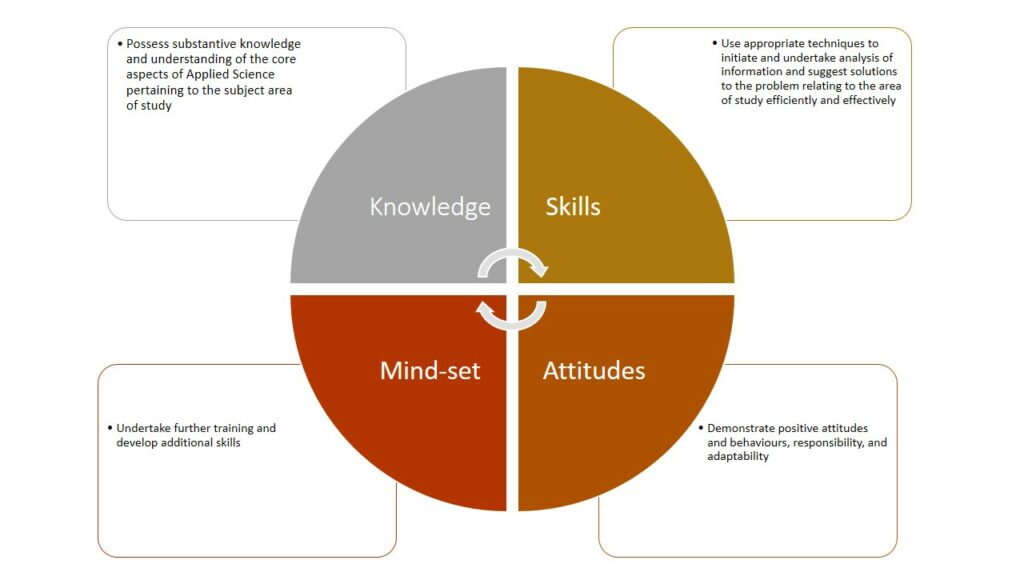
Program Intended Learning Outcomes
In order to create a graduate with adequate knowledge, skills, attitudes and mind-set in the field of Applied Science (pertaining to the subject area of study), the program is designed to achieve specific Program Intended Learning Outcomes (PILOs). Thus, after the successful completion of the B.Sc. (Honours) Degree in Applied Sciences, a student should be able to:
- Demonstrate an advanced knowledge of Applied Science pertaining to the core aspects of Applied Science pertaining to the subject area of study.
- Critically analyse data to draw and justify conclusions and make predictions.
- Use practical skills effectively and efficiently to develop sustainable solutions to problems.
- Apply creativity and problem-solving skills in real world problems.
- Communicate the issues and solutions effectively and able to influence target social groups.
- Exercise personal and team responsibility in the professional environment.
- Demonstrate accountability and ability to instill entrepreneurship.
- Give leadership and promote social engagement.
- Demonstrate social responsibility and commitment to sustainable development.
- Exercise and further develop new competencies and assume major responsibilities with confidence.
- Engage in independent learning and undertake further training and develop additional skills.
The Graduate Profile of Bachelor of Science Honours in Industrial Mathematics
The B.Sc.(Honours) Degree in Industrial Mathematics fulfils the requirements of the Level 6 of Sri Lanka Qualification Framework (SLQF –2015) with 120 credits of teaching and learning workload. The figure below summarizes the degree program.
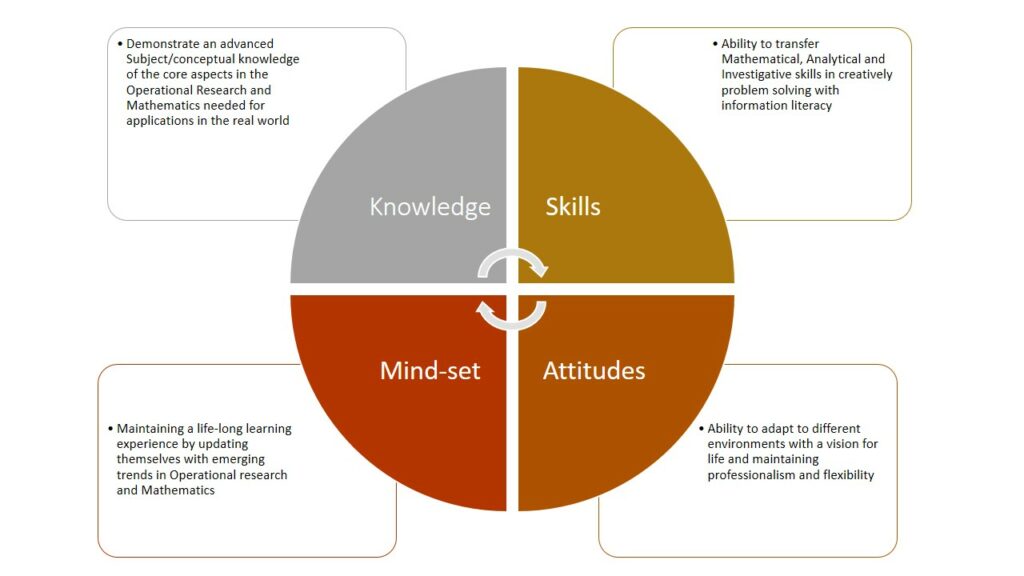
Program Intended Learning Outcomes
n order to create a graduate with adequate knowledge, skills, attitudes and mind-set in the field of Industrial Mathematics, the program is designed to achieve specific Program Intended Learning Outcomes (PILOs). Thus, after the successful completion of the B.Sc. (Honours) Degree in Industrial Mathematics, a student should be able to:
- Express sufficient subject knowledge in the areas of Operational research and Mathematics.
- Demonstrate practical knowledge and application in the areas of Operational research and Mathematics.
- Be flexible and approach the same problem from different points of view and present a solution clearly, making their assumptions explicitly.
- Apply creativity and problem-solving skills in real world problems.
- Listen effectively and employ communication skills to convey own views and attitudes to help themselves in social interactions.
- Solve problems using mathematical software and communicate highly technical information.
- Practice teamwork and leadership skills in working with peers for projects, training programs and various assignments.
- Use managerial and entrepreneurship skills in employment and to be innovative in creating new business opportunities.
- Demonstrate information usage and management skills during the learning process as well as in the working environment.
- Apply networking and social skills in the society (e.g. working place, educational institute) for an effective involvement in assigned responsibilities.
- Demonstrate adaptability and flexibility to various changes in the society and show the ability to absorb new trends.
- Demonstrate good attitudes, values and professionalism gained from the degree program and utilize them for the achievement of the organizational and career excellence.
- Create vision for life in searching for career opportunities and during the progression of career path.
- Choose self-updating and lifelong learning strategies in personal development with a vibrant set of goals.
The Graduate Profile of Bachelor of Science (Joint Major) Degree in Chemistry and Physics
A student who has completed the B. Sc. (Joint Major) Degree in Chemistry and Physics at the Faculty of Applied Sciences, Rajarata University of Sri Lanka will fulfill the requirements of the level 6of Sri Lanka Qualification Framework (SLQF-2015) with an education at an advanced level, including both specialist knowledge and general intellectual and developed life skills that equip them for employment, research and citizenship and lay the foundations for a lifetime of continuous learning and personal development.
Therefore the graduate profile of the B. Sc. (Joint Major) Degree in Chemistry and Physics could be illustrated in the following figure in line with the SLQF.
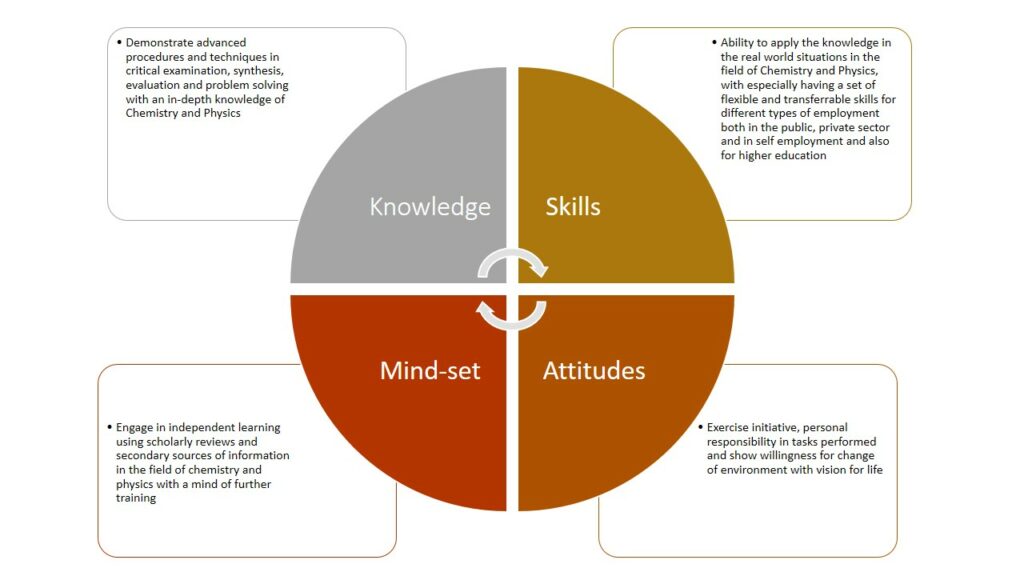
Program Intended Learning Outcomes
n order to create a graduate with adequate knowledge, skills, attitudes and mind-set in the fields of chemistry and physics, the program is designed to achieve specific Program Intended Learning Outcomes (PILOs). Thus, after the successful completion of the B.Sc. (Joint Major) Degree in Chemistry and Physics, a student should be able to:
- Express sufficient subject and theoretical knowledge with critically analyzing data, making judgment and solving problems in the area of Chemistry and Physics.
- Use ideas and techniques together with practical skills to solve real world situations.
- Work collaboratively with others, interacting effectively and demonstrating respect for others.
- Communicate ideas, issues and solutions efficiently and effectively in the current developments in the area of Chemistry and Physics.
- Work independently with the ability and self-discipline to plan and achieve personal and professional goals.
- Apply creativity and problem solving skills in both theoretical and practical scenarios in the field of Chemistry and Physics.
- Create vision for life in searching for career opportunities and during the progression of career path.
- Lead in the community, including a willingness to engage in constructive public discourse and accept social and civic responsibilities with self-updating and lifelong learning strategies.


